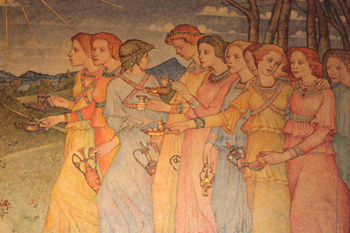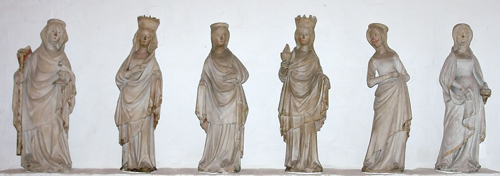For Sunday November 12, 2017
Lectionary Readings (Revised Common Lectionary, Year A)
Joshua 24:1–3a, 14–25
Psalm 78:1–7
1 Thessalonians 4:13–18
Matthew 25:1–13
A guest essay by Liz Milner. Milner serves as a staff chaplain with CIC Ministries (www.cicministries.org) in the Santa Clara County jails, which has one of the biggest jail systems in America, with about 4,000 men, women and children incarcerated. Liz works primarily with the medium level security men and all levels of female inmates, as well as the officers and staff, and the several hundred volunteers. Prior to working in the jail she served as an executive pastor in a local church, and completed her MDiv at Fuller Seminary. She is mother to three teenagers, and loves cooking, and relaxing with her husband and Finnley the dog. To contact Liz, her email is staffchaplain@cicministries.org.
There are some parts of the Bible that remind me of my nightmares. The story of the ten bridesmaids in this week's gospel is one such passage. It calls to mind a recurring dream that haunted me through my young adulthood. I dreamed that I was walking into a great hall to take my final exams. As I walked to my desk, seeing the question paper lying, waiting for me, I suddenly realized this was a language exam. A language that somehow I had managed to avoid learning all year because I had not turned up to class. A language that I was about to be rigorously tested on, and that was nonsense to me because of my poor attendance and preparation. I’d blithely gone about my year ignoring my responsibilities and duties and now I would pay. A sense of doom and panic settled on me as I walked towards the desk. I was not ready. The end was nigh.
The parable of the ten bridesmaids evokes feelings of shame and fear in me, much as my dream did. I fear being one of the five foolish maids who didn’t think ahead to bring extra oil, left the vigil to search for the required substance, and came back to rejection and a bridegroom who claims to “have never known” them. What is more, I imagine the smug grins of the five wise maids, raising their glasses and winking to their foolish compatriots from the warmth and jollity of the ballroom. What was Jesus thinking?
Whenever I am troubled by Jesus’ teachings I remember my seminary professor beating the drum of context. “Take a step back, Liz, survey the landscape before you zero in on this particularly troubling aspect.” Let’s survey for a moment.
 |
|
The Parable of the Ten Virgins by Phoebe Traquair (1852-1936), Mansfield Traquair Church, Edinburgh.
|
The chapter before this story sees the disciples asking Jesus to help them understand how they can discern the signs of the end of the age. Jesus launches into a terrifying description of the travails that will accompany the last times. Then he tells the bridesmaids’ story for this week, followed by the parable of the talents — another troubling story that seems to suggest to us not to play it safe with the assets God gives us, but to risk using them even if that means we may potentially lose them. Finally, Matthew 25 closes with the parable of the sheep and the goats — another story that haunted me as a young Christian. God divides people into two groups — sheep that end up fine and goats that don’t. What decides your fate? In a statement that forms the foundation of ministry for many chaplains such as myself, it seems as if Jesus indicates that those who serve “the least of these” — the sick, the aliens, the hungry, the naked, and the imprisoned, it is they who will be saved, and indeed in their service actually minister to Jesus Himself.
Tarry a moment with this wide view of Jesus’ teaching. Let your eyes roam over it and take in the grand view of where He is heading. Let His words flow over you and massage your heart before we engage the bridesmaids again.
As I contemplate this context, within which the bridesmaids’ tale is told, I hear Jesus responding to anxious disciples who are eager to understand when the end times will descend. He lets them know that there will be signs, terrible signs, that will give people clues that the end is coming, encouraging them not to listen to idle rumors, but to trust His words. The parables of the talents and the bridesmaids compare the listeners to servants, entrusted with a role, while their master is gone. A contrast is made in each between those who perform well, and those who do not.
In the case of the talents, it is the servant who, fearing the master’s harsh treatment, buries his talents rather than risking investment, who is punished. The servant in that parable, who was cast into outer darkness, was treated that way because he acted out of fear and hid the master’s gold in the ground.
The parable of the sheep and the goats suggests that the presence of Jesus is found in those who have in some way found themselves at the bottom of the human heap, whether due to misfortune (the starving and naked) or their own actions (the imprisoned). It is those people who failed to care for the immediate needs of the oppressed, and the criminal, who are cast into ‘eternal punishment’ this time.
With these teachings of Jesus ringing in our ears, how can we approach the parable of the bridesmaids?
Firstly, let us note that had the bridegroom not been delayed, none of this would have mattered. The ten maids would all have made it into the party with lamps lit, ready to dance the night away. Therefore, it seems that the risk arises in our response to a delay. If we accept the traditional interpretation that the bridegroom’s arrival represents the return of Jesus, what risk do we face during the decades, the centuries, the millennia where God seems to tarry?
For myself, as I work with inmates in the county jail, hearing stories of injustice, broken lives, addiction, heartbreak, and violence every day, I am tempted to give up on faith. Where is God? Why is He leaving us so long in this dark night where the oil seems to be burning low? Might we be tempted to react with fear, that our oil might run out before He gets here, and run into town to purchase more? Leave our posts, fleeing the darkness, and rush to another source to keep our light glowing just a little bit longer?
The final line of the parable admonishes us to “stay awake,” suggesting that the five foolish bridesmaids were in some way asleep. This could be misleading, as we read in the story that all ten maids slept. The sleeping was not the problem, but rather the fact that five of them left the room to replenish supplies. The Greek words used for “stay awake” can also be interpreted to mean “stay alert, engaged, for there is a task to do.”
 |
|
The Five Wise Virgins with a personification of the Church, c. 1400, St. Anne's Museum, Lübeck, Germany.
|
In what way did the five foolish maids lose focus and fail to be alert to the situation? It is here that the context of Jesus’ other teachings may come to our aid. Could it be that it is the maids’ fear of the bridegroom’s reaction to them that causes them to flee to the town? Could it be that waiting in the darkness, even if their lights had gone out, would have been a more faithful way to stay engaged with the role assigned to them by their master? If Jesus is to be found amongst the naked, hungry, thirsty, and criminal, could it be that He would respond with compassion to the five maids who might come trembling before Him confessing they had run out of oil? We will never know, since those five fled rather than risk waiting on the groom. However, my experience of Jesus, and my wrestling to understand this story in the context of Jesus’ other teachings and ministry, invites me to wonder if it might be better to stay in the darkness rather than flee the scene from fear of being found wanting.
I find comfort in the Jewish rabbinical tradition that the Scripture, and indeed God Himself, is to be wrestled with and argued over. Since Jacob wrestled ‘the man,’ commonly thought to be God Himself, shouting, “I will not let you go unless you bless me,” the Jewish people have encouraged an approach to faith that actively and proactively engages God and His words to us.
In contrast, my experience of much of modern Christianity’s approach to Scripture and faith is a more passive acceptance of the first reading of a text and a distinct lack of robust wrestling! It seems that fear of being wrong sends many of us running to make sure we have enough oil rather than sitting in uncomfortable darkness with a text for too long. Indeed, Jesus seems to encourage this intentional, proactive, even outrageous kind of interaction with Himself when He responds to those such as the Syro-phoenician woman with compassion and praise.
When confronted with passages such as the ten bridesmaids, it may do us well to wrestle with Jesus, refusing to let the interaction go until we receive a blessing. Maybe the foolishness Jesus is rebuking in this parable is the fear that caused the women to flee, rather than remaining in the darkness and throwing themselves on the mercy of the coming groom. It is hard to wait with faith in darkness, knowing our own resources have run out.
As I return to the dream that haunted me for so long, I wonder how it might have ended had I walked up to the teacher, trembling, to confess my failure to prepare for her exam. I assumed, given my own experience with education, a brisk dismissal and a failing grade. Jesus may be re-writing my assumptions about authority, failure, and my own response to my inadequate preparations for life. A true blessing to receive.
Image credits: (1) Wikipedia.org and (2) Wikipedia.org.





